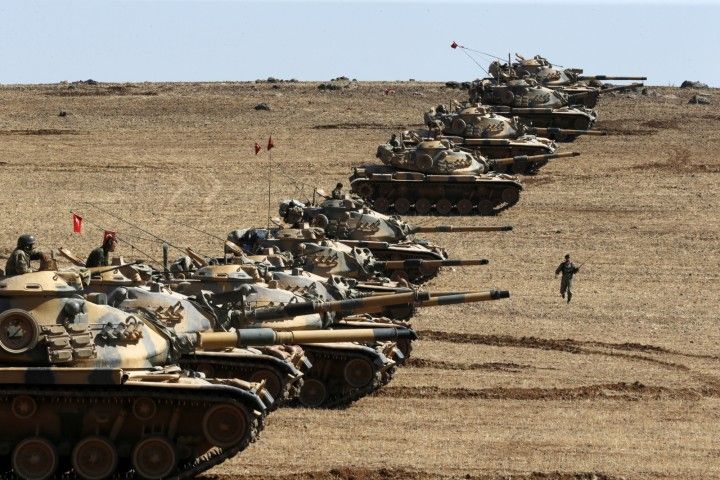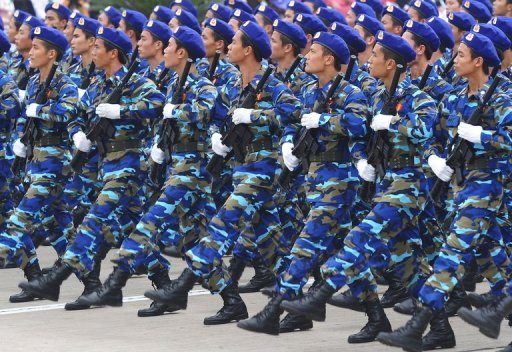Advancing Islamic State fighters seized a third of the Syrian border town of Kobane Thursday despite US-led air strikes, as Turkey rejected sending troops in against the jihadists on its own.
In fighting that killed dozens, calls grew for ground action to support Kobane’s beleaguered Kurdish defenders.
But after talks with NATO chief Jens Stoltenberg, Turkish Foreign Minister Mevlut Cavusoglu said Ankara could not be expected to act alone.
“It’s not realistic to expect that Turkey will lead a ground operation on its own,” he said.
Ankara is under pressure over its inaction, and protests in Kurdish areas of Turkey have sparked clashes that claimed at least 23 lives and forced authorities to impose a curfew in six provinces.
Kobane, where Kurdish militia are still holding out after a three-week siege by the jihadists, has become a crucial battleground in the fight against IS.
With the global media gathered just across the border in Turkey, its conquest would be a highly visible symbolic victory for the extremists.
Fresh air strikes
The US-led coalition launched a fresh air strike on eastern Kobane on Thursday evening, the Syrian Observatory for Human Rights said.
Hours earlier, the US military said five strikes were carried out in Kobane Wednesday and Thursday, hitting two IS combat units, destroying a support building and two vehicles, and damaging a training camp.
“Indications are that Kurdish militia there continue to control most of the city and are holding out against ISIL,” it said, using an alternative acronym for IS.
But a Kobane refugee who spoke to AFP in Turkey said “air strikes are not helpful alone. We need heavy weaponry and tanks to support a ground operation.”
Street battles have been raging since the jihadists breached Kobane’s defences earlier this week.
IS fighters pulled out of some areas Wednesday but have since renewed their offensive and seized more ground, the Britain-based Observatory said.
“Despite fierce resistance from the Kurdish forces, IS advanced during the night and controls more than a third of Kobane,” Observatory director Rami Abdel Rahman told AFP.
Fierce clashes
Eleven IS fighters were killed and four captured in Kobane Thursday, the Observatory said.
Clashes were ongoing in northeastern Kobane, where several official buildings and the Kurdish command are based, and were particularly fierce in the town’s southwest, it added.
Nearly 500 people, mostly combatants, have been killed in and around Kobane and 300,000 have fled the region, two-thirds of them to Turkey, since the assault began in mid-September.
Kobane, also known as Ain al-Arab, would be a major prize for the jihadists, giving them unbroken control of a long stretch of the border.
The extremists have seized large parts of Iraq and Syria, declaring an Islamic “caliphate” and committing widespread atrocities.
Washington launched an air campaign against IS in Iraq in August, and last month expanded it to Syria with the participation of Arab allies.
After meeting defence chiefs on Wednesday, US President Barack Obama admitted that the fight against IS would not be easy.
“This is not something that is going to be solved overnight,” he said.
The Pentagon said coalition aircraft were hitting IS at every opportunity but that, without a force on the ground to work with, there were limits to what could be done.
“We don’t have a willing, capable, effective partner on the ground inside Syria right now. It’s just a fact,” said spokesman Rear Admiral John Kirby.
Obama has dispatched retired US general John Allen, and the US pointman on Iraq, Brett McGurk, to Ankara to squeeze commitments from Turkey on what role it can play in the coalition.
The Turkish response has been complicated by concerns over emboldening Kurdish separatists who have waged a deadly insurgency for three decades.
Pro-Kurdish protesters angered by Turkey’s lack of action have clashed with police for three nights running, defying an army-imposed curfew.
Hundreds of protesters took to the streets again late Wednesday in cities of Turkey’s mainly Kurdish southeast and were dispersed with water cannon and tear gas, television said.
Protests and sporadic clashes have also erupted in Europe.
More than 1,000 Kurds returned to the streets in Germany overnight, after unrest in the northern port city of Hamburg injured 23 people the previous night.
Turkey has been calling for a buffer zone to protect its border and provide some protection for fleeing Kurds, but Russia said Thursday any such plan would need the UN Security Council’s approval.
More than 180,000 people have been killed in Syria since an uprising against President Bashar al-Assad’s regime began in 2011 and evolved into a multi-front civil war that has drawn thousands of jihadists from overseas.
Regime air strikes killed at least eight people Thursday, including two children, in the town of Arabeen, near Damascus, the Observatory said.











